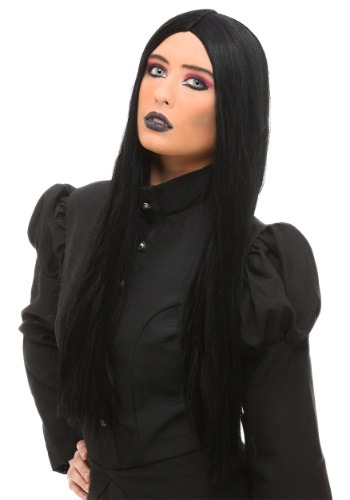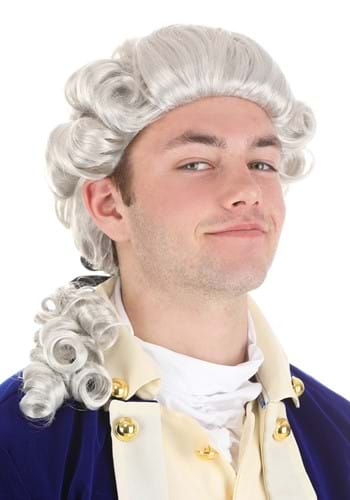
Colonial Clothing
Let's step back into the time machine for a fashion adventure. Where would you like to go? The colonial era, you say? Well, we'll have a good distance to travel. The Colonies were founded in 1607 and lasted through 1776, so as you can imagine, the fashions changed along the way. No worries, though. We'll gladly cover the different eras for everyone, from the Revolutionary soldiers to upper-class ladies like the Schuyler sisters.
Colonial Dress
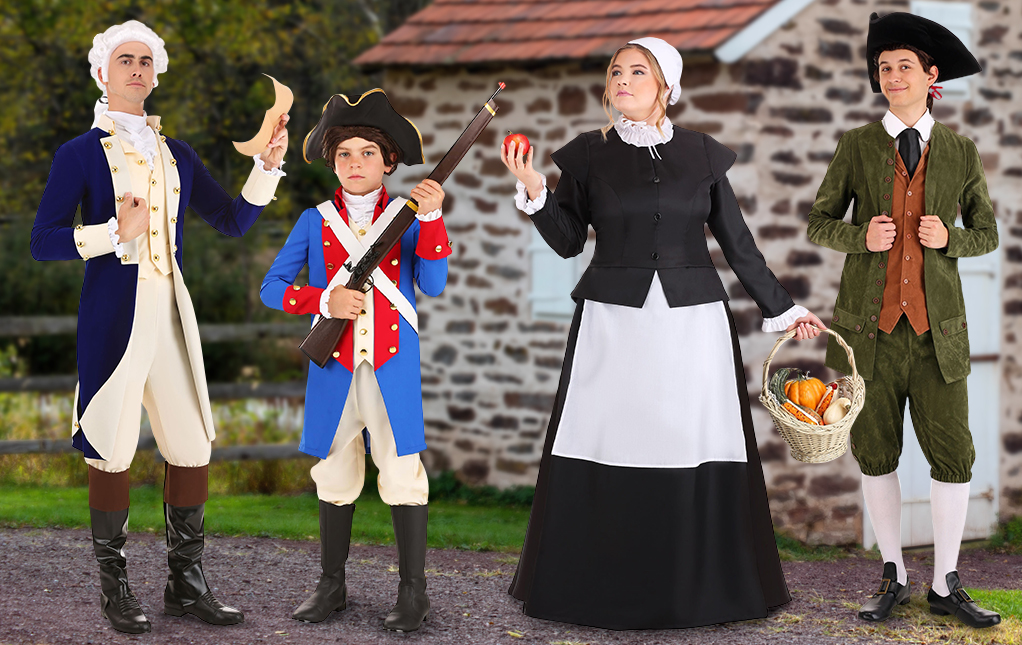
We've decided to start you off with a rich selection of clothing from the colonial era. We've included a Puritan costume that would look right at home on the streets of Boston in the 1620s. The adult colonial costume belongs in the 18th century with the merchant class. The ensemble featuring the elegant blue coat and white wig would be an excellent choice for anyone dressing up as the founding fathers because it has a formal, military bearing.
In the following sections, we'll cover information on each era. Different hairstyles and clothing styles will make it clear where and when you belong. You'll want to read all about the 17th-century costumes if you're looking for an outfit that makes you seem like you're straight out of Salem, Massachusetts. Then again, if you're aiming for a look that will set you against the 18th-century revolutionary war scene, a costume from the 18th century is the way to go.
18th Century Costume
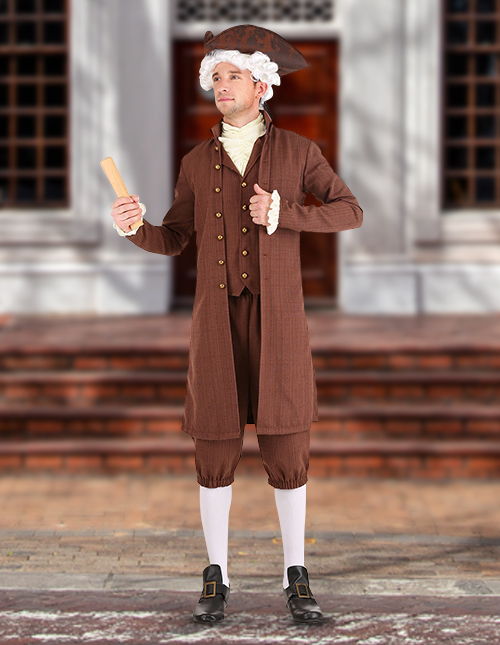
Imagine what it would have been like to walk the streets of East Coast American cities in the 1700s. The roads are muddy and busy with horses pulling carts and carriages. This is not a place to wear long dress pants. So it makes sense that men of all classes wore suits featuring knee-length breeches. Depending on the occupation and position of the man, they'd wear a full-dress coat or a less formal frock. The difference between the two? The full-dress coat had a turned-up collar, often paired with a ruffled jabot-style tie. The frock had a turned-down collar, similar to the suits we're familiar with today. The John Adams costume we've included here has an upturned collar with a subdued jabot. It's paired with a wig for a formal air.
Women were less concerned with keeping their hemlines clean and more concerned with keeping their ankles covered. Women's fashion became more complicated the higher one rose in the social ladder. Higher-class women wore different clothing depending on the time of day. A dress suitable for daytime events had a higher neckline, as seen in the costume featured here. To prepare for nighttime events, upper-class ladies would don full skirts with cages underneath called panniers. Unlike their modest daytime gowns, these looks sported bared arms and low-cut bodices. The women's colonial costume would be appropriate for a woman in the middle class who's dressed for a special daytime occasion.
17th Century Costume
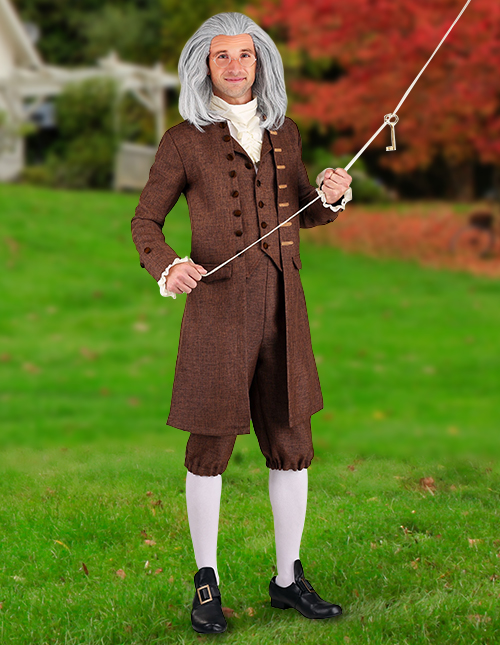
In the 1600s, colonial America was a rough place to live. Many people lived in simple wooden huts, even in larger towns. Water was often unsafe to drink, so colonists drank locally-made alcoholic beverages like cider and beer. By mid-century, the colonists were escaping the dark ages of the witch hunt, Plymouth Rock era. Every day people had enough energy to contemplate seeking independence from England's reign. At this point, men in the merchant class would have worn a costume such as the Benjamin Franklin costume pictured here.
All this energy from healthier crops and all that abundant turkey meant that the colonist could move on from their dark, Puritan uniforms. Still, throughout 17th century America, everyday American outfits were simple. The ensembles were made of wool and linen fabric without patterns or bright colors. Although, you shouldn't feel like you only have to wear black when you're dressing up as a Pilgrim! Though natural colors were preferred by the Puritans, early settlers often wore violet, blue, and green. Read ahead for a detailed breakdown of the clothing that made up the classic Pilgrim costume.
American Revolution Costumes
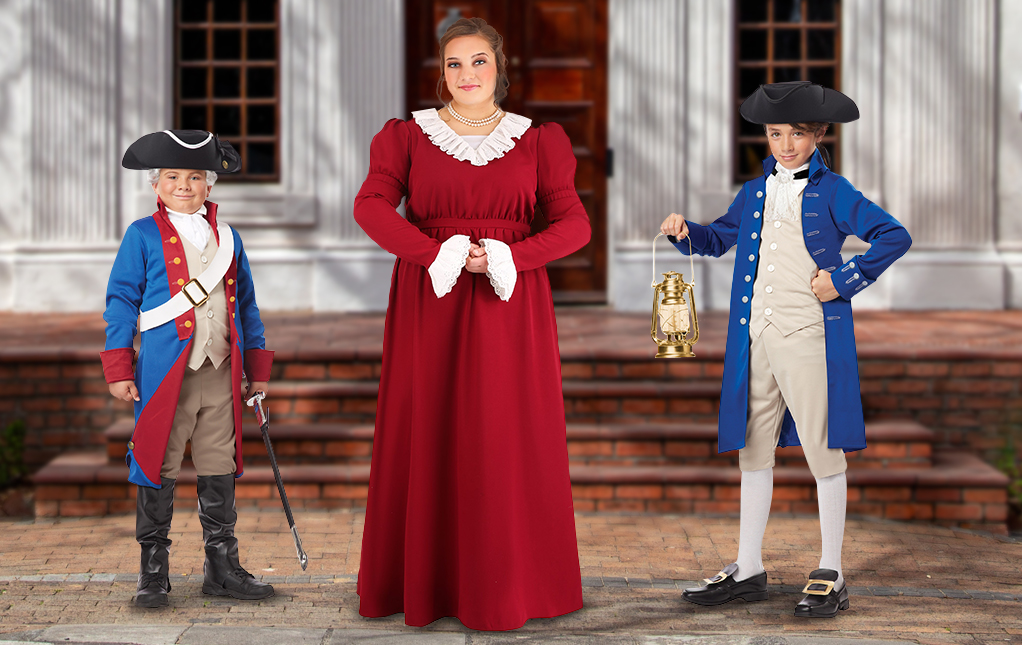
Do you want to appear as if you'd be right at home in the Boston pubs that hosted revolutionaries like John Adams and Alexander Hamilton? Then you're in the right place. These revolutionary looks are great for school projects, Fourth of July events, and even walks through colonial towns. Whether you want to wear a gown and talk politics by candlelight or look ready for a skirmish with the English, we have costumes for everyone!
The classic George Washington look is instantly recognizable from textbooks and artwork, though the blue jacket wouldn't become part of the Revolutionary war uniform until years into the conflict. When the war began, colonists fought the British in brown. Once the uniform was established, the lack of funds meant that soldiers were mismatched for most of the war. Soldiers often had different trim—like the red facing on the American patriot costume—that represented where their unit was from.
As an upper-class merchant, Paul Revere would have had a pretty fancy wardrobe. The deep blue of the costume featured here would have been just the thing for riding full speed into the night to warn of the incoming red coats!
Colonial Women Costumes
Colonial women typically had a lot of work on their hands. Cooking and cleaning was a much more daunting task than it is today. It required building a fire, lugging iron pots around, and maybe even catching a chicken or two. With this in mind, it makes sense that colonial women's clothing was not centered around the corset. Clothing in the 17th century and 8th century was simpler than in the Victorian era. We'll go into more detail about the different pieces of the typical women's colonial costume in the next two sections.
Puritan Costume
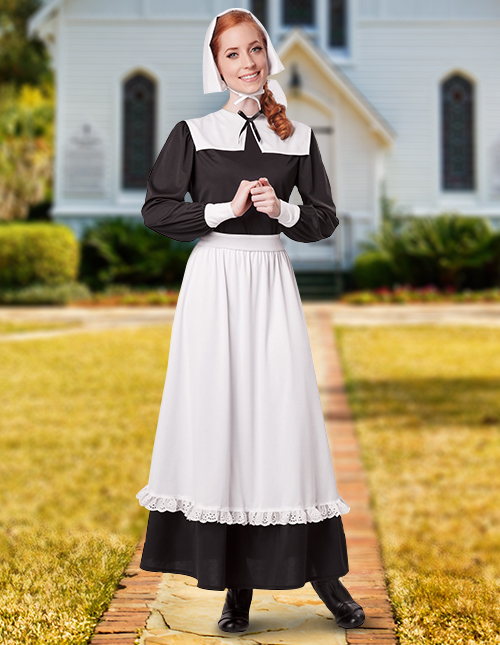
Puritans were all about following the rules. This especially came into play when it came to their clothing. Extra trimmings and ornaments were banned in Puritan culture. Women wore long sleeves in all weather, simple boots, and kept their hair covered by a loose-fitting cap called a coif, as seen in the Pilgrim costume featured above. If you're looking to play a part in classic plays like The Crucible or revisit colonial towns in style, our Pilgrim costume is a great way to go!
Colonial Dress Costumes
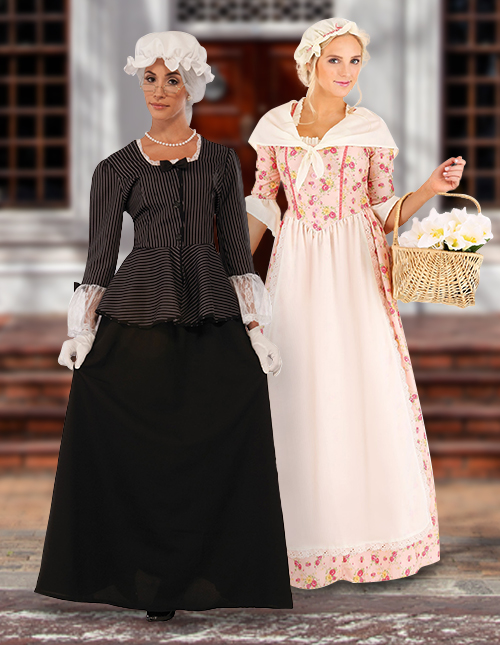
Now, modern folks might feel a little uncomfortable in all that clothing. Luckily, we have a few options that fit the 17th-century wardrobing bill. Our prairie dress costume would work well for a well-to-do farm wife, especially when paired with a white apron and a scarf tied over the hair. The colonial dress fits the 17th-century era best, a wonderful choice for those who want to look right at home at a function with the Schuyler sisters. Those who want a more buttoned-up and proper costume might like dressing up as Martha Washington herself!
Men's Revolution Costumes
We've all seen pictures of the founding fathers. Fitted jackets paired with low ponytails and tricorn hats. You can picture it, right? Whether you want to dress up as Thomas Jefferson, John Adams, or George Washington himself, you'll find the costumes you need to revolutionize your costume game here. In the following sections, we'll give you some ideas on how to bring your character of choice to life. We'll also tell you more about men's colonial clothes just for a little historical fun!
Colonial Soldier Costume
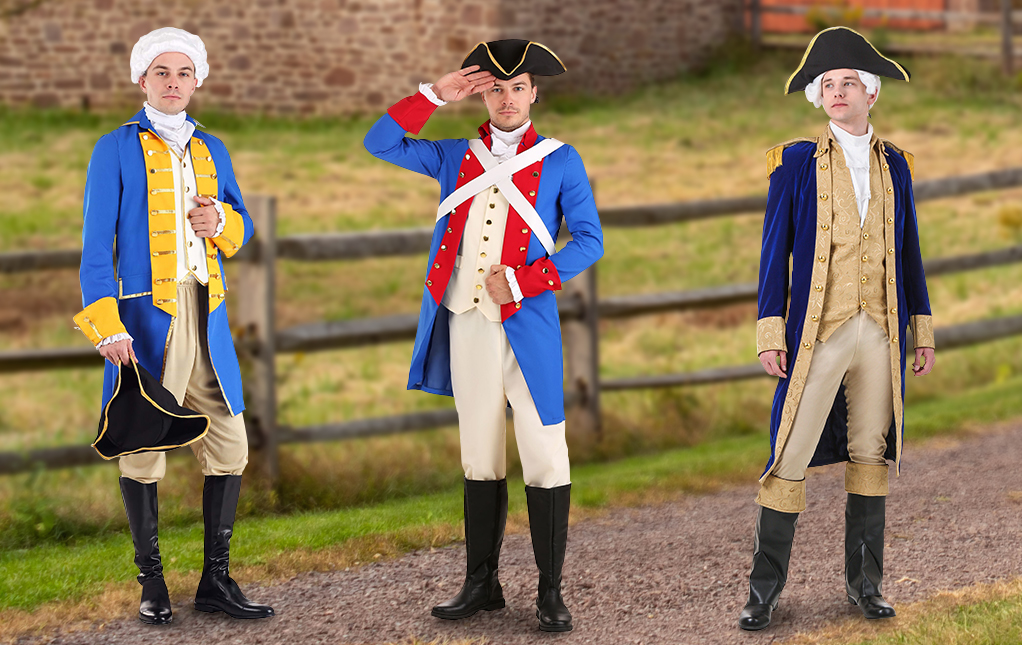
Colonial soldiers wore a variety of ensembles. Before the Revolutionary War, the militiamen simply wore their own clothes. No arms or uniforms were issued. They'd arm themselves with the same rifles that they'd go hunting with. If you're dressing up as a Revolutionary War soldier, however, the dashing blue coat trimmed with red facing and layered over a white shirt is the classic image. You can set your character apart with accessories. Consider adding a drum or a penny whistle to your costume. That will help you feel like part of the army without carrying a heavy 17th-century firearm. Want an even more dramatic angle? Try smudging dark makeup on your face and wrapping a bandage around your head for a stoic, injured look.
Men in the colonial era often wore similar suits no matter their class. The main difference between the suits was the cut of the jacket and the material of the clothing. You've probably seen the suits in paintings of John Adams and Benjamin Franklin. Men's suits started with a simple shirt that fell to the knees. Stockings made of linen, wool, cotton, or even silk were layered underneath. A pair of knee-length, high-waisted breeches would be layered over the top. Then a waistcoat (also known as a vest) would button up over the white shirt. A long coat was layered over the whole ensemble. And finally, the look was topped off with a tricorn hat. The men's colonial outfit was a dapper look that lasted into the 19th century.
Kid's Colonial Costumes
Are your kids ready to have a little historical fun? Luckily, it's super easy to put together authentic colonial costumes for kids. This is because children in the colonial era dressed a lot like their parents. Little girls wore stays and petticoats while little boys wore breeches and jackets. Little boys were actually strapped into stays because colonial parents believed that helped with good posture. While we wouldn't suggest putting any kiddos in stays, if you're looking for a colonial costume for your kid, you can choose an outfit that's just like the adult costumes that you like best. Check out some great options below!
Colonial Girl Costume
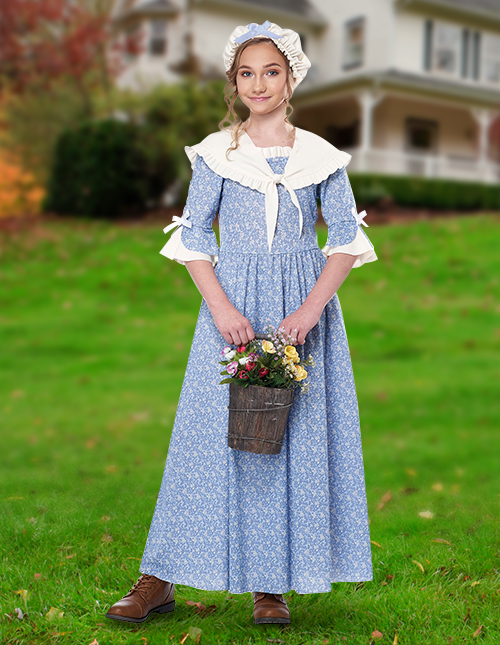
These lovely costumes are great for school projects, plays, and historical events. The colonial village girl costume can be paired with ankle boots and a basket to flush out her character. Or if your child wants to be a little dressier, she'll love the Betsy Ross costume. Elegant patterns and a full skirt will make any historically minded kid feel like a piece of the past!
British Colonial Outfit
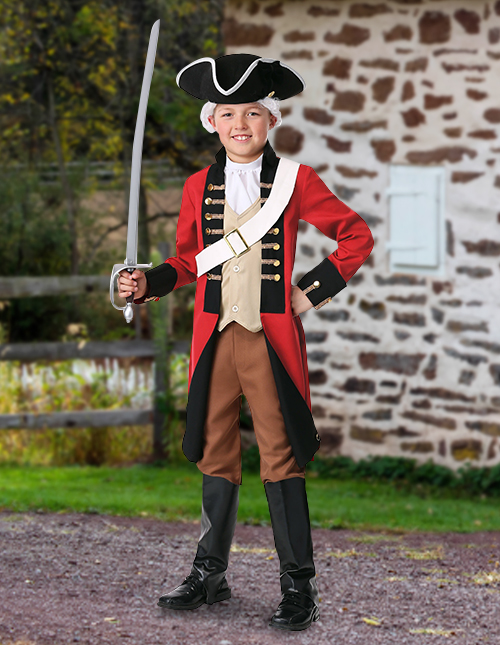
The British are coming! The British are coming! Sorry, we couldn't have a page about Revolutionary War costumes without mentioning that classic phrase. And honestly, this brings to mind an over-the-top group costume daydream of ours. We think an adorable troop of Redcoat soldiers would make a delightful Halloween costume for trick or treating. Especially if they were accompanied by a loud-mouthed Paul Revere. Whether you're looking for a Redcoat costume for Halloween or a school project, this look will make your kiddo look dapper and ready to stand at attention!

